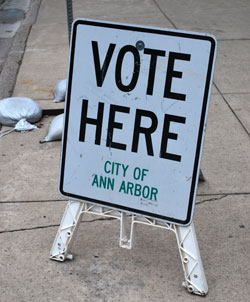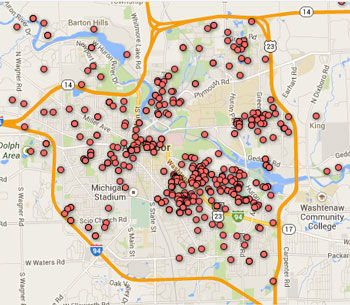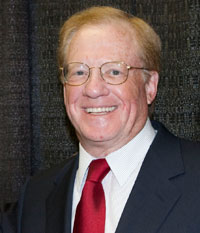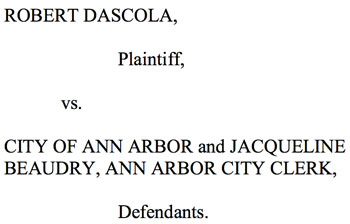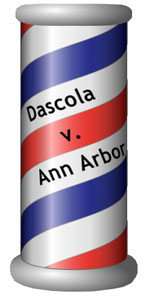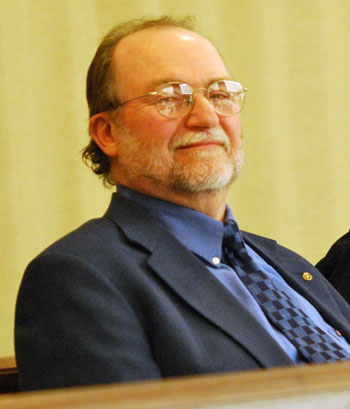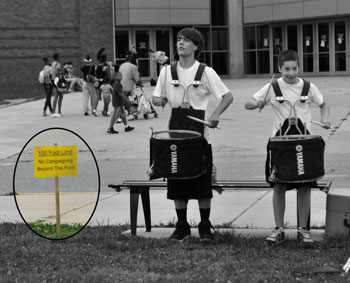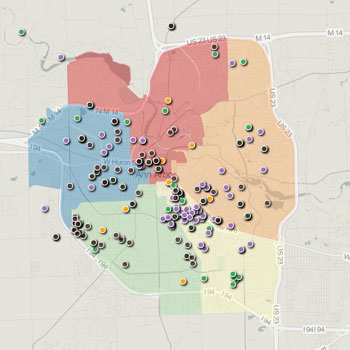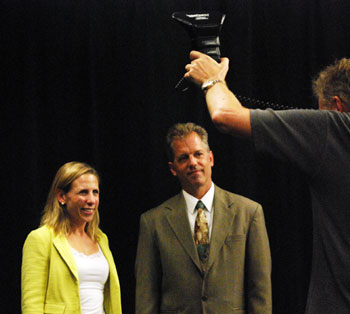How Ann Arbor Council Races Were Won
The results of city council Democratic primary elections held in the city of Ann Arbor on Aug. 5 can fairly be considered determinative of Nov. 4 election outcomes – because no Republicans or independents filed petitions to qualify for the ballot.
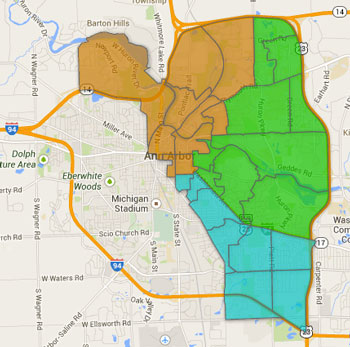
City council races were actively contested in only three of Ann Arbor’s five wards in the Democratic primary: Ward 1 (orange), Ward 2 (green) and Ward 3 (teal).
November will see at least three newcomers to the 11-member council – Kirk Westphal in Ward 2, Julie Grand in Ward 3, and Graydon Krapohl in Ward 4. Westphal and Grand won their respective Democratic primaries that featured no incumbents. Both candidates were coming off unsuccessful council campaigns last year – against Jane Lumm (Ward 2) and Stephen Kunselman (Ward 3), respectively.
Westphal received 1,819 votes (59%) to Nancy Kaplan’s 1,261 (41%) in a race that was anticipated to be somewhat closer. Grand received 1,516 votes (51.1%) compared to Bob Dascola’s 794 (26.8%) and Samuel McMullen’s 616 (20.8%). That gave a decisive result to a Ward 3 race that had been fraught with legal disputes – about Dascola’s eligibility to appear on the ballot in the first place; and then about how to count misprinted absentee ballots, which omitted Dascola’s name.
Krapohl’s race did not even appear on the Aug. 5 ballot – because he was unopposed in the Democratic primary and no Republican qualified for the ballot. The omission of the race from the ballot under those conditions is stipulated in a clause of the city charter.
Krapohl will be filling the seat to which Democrat Margie Teall did not seek re-election. Westphal will almost certainly be filling the Ward 2 seat that Sally Petersen left to pursue an unsuccessful mayoral campaign. And Grand will almost certainly be elected to fill the seat vacated by Christopher Taylor, who ran a successful campaign for mayor.
Taylor, who’s currently a councilmember representing Ward 3, will be the Democratic nominee in the Nov. 4 general election against independent Bryan Kelly. Assuming Taylor does prevail, he will remain on the council as mayor. And among the 10 councilmembers who represent one of the five wards, he’ll almost certainly see a total of seven returning faces, including the two incumbents who prevailed in the Aug. 5 primaries.
That’s because those two incumbents, like the new Democratic council nominees, will also be unopposed on the November ballot. First-term Ward 1 councilmember Sumi Kailasapathy prevailed over Don Adams, who was seeking elected office for the first time. Kailasapathy received 1,113 votes (56.8%) compared to 840 (42.8%) for Adams.
And first-term Ward 5 councilmember Chuck Warpehoski prevailed over Leon Bryson, who had announced he was withdrawing from the race after the deadline to remove his name from the ballot. Bryson still collected 674 votes (18.6%), but Warpehoski’s total was 2,936 (81%).
Those three newcomers and two incumbents will join the five councilmembers who are currently in the middle of their two-year terms: Jane Lumm (Ward 2), Jack Eaton (Ward 4) and Mike Anglin (Ward 5) – as well as Sabra Briere (Ward 1) and Stephen Kunselman (Ward 3), who were unsuccessful in their mayoral bids.
Below are some maps illustrating the geographic distribution of votes in the three actively contested city council races, as well as some limited analysis of the Ward 2 race in terms of questions that were part of a pre-election poll conducted by Public Policy Polling. [Full Story]




